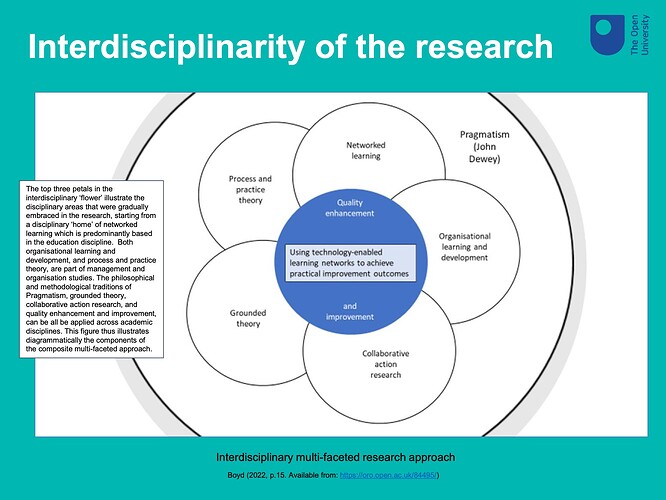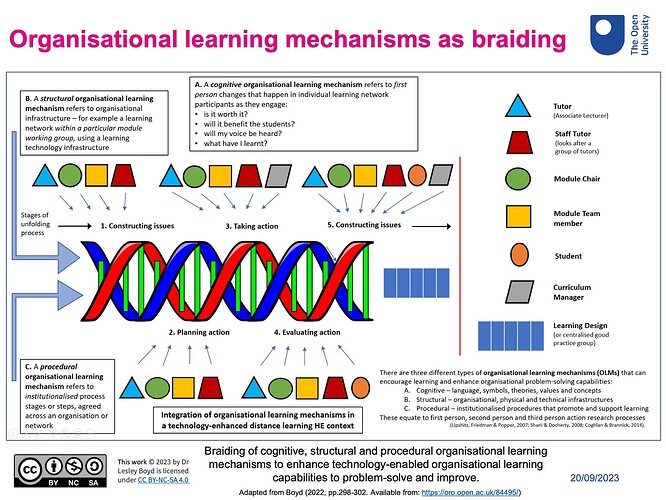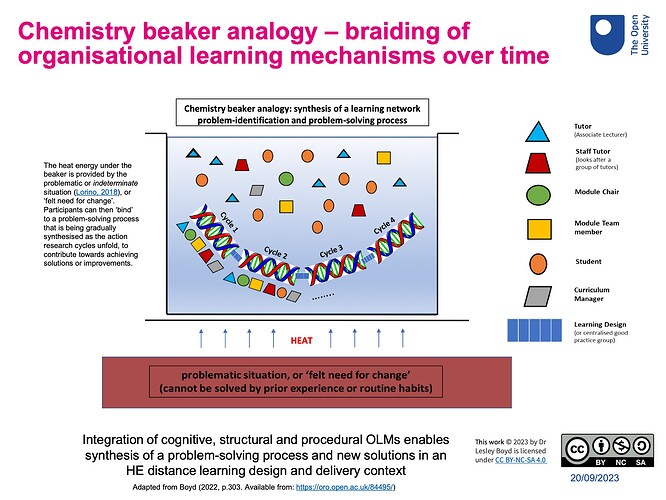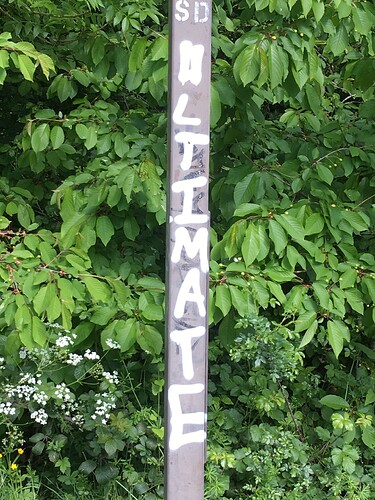An exploratory topic on my concept of ‘open theory building’, arising from my recently completed PhD research at the UK Open University. I was due to present a session in Edmonton but am unable to travel. Thanks so much to the reviewers for their enthusiastic response and for the possibility of participating remotely.
For anyone interested, this is the abstract for my session that was accepted for
Lesley Boyd Abstract for OE Global Conference - Sept 2023.pdf (186.0 KB)
the conference.
My first step is to relate my research to the conference vision of braiding and two-eyed seeing. My research is interdisciplinary, and also involves a combination of methodologies (technology-enabled collaborative action research and grounded theory method (GTM). I facilitated and conceptualised a collaborative action research problem-solving process that connected the different types of practitioners involved in module design and delivery at the OU (like the module team, remote tutors and students). These people are traditionally geographically separated, but even more so since the pandemic.
So to start off, I’m attaching three pictures (diagrams) from my presentation to introduce some ideas. The first illustrates my ‘interdisciplinary flower’ to show how I combined different approaches.
The second shows my DNA analogy, which I think is another great analogy for braiding. The famous two strands in DNA are reliant on one another, and braided together via the DNA ‘bases’, which in my analogy are people, or project participants. I make the analogy between DNA and ‘organisational learning mechanisms’, which help us to learn and solve problems together.
The third shows a further analogy of a chemistry beaker, to illustrate how the disparate practitioners involved in a fragmented and complex problem situation, can ‘bind’ to an unfolding problem-solving process, if there is sufficient energy and ‘felt need’ to do so. Initially they are swimming around relatively unconnected in the beaker, and the unfolding action research process engages them to mutually reflect and learn about the issues and what might be done, then to take action and evaluate.
This may be quite a lot to take in, as I cannot lead you through it in person, and the connection to openness and ‘open theory building’ is not yet immediately obvious. However I’m experimenting with this approach as @cogdog has invited!! And hopefully breaking the ice for anyone else who wants to have a go. I could also try putting up some short explanatory videos if anyone is interested ![]() .
.
My next stage could be to share the conceptual framework, which gives a way of thinking about unfolding collaborative problem-solving processes, connected by some sort of learning technology infrastructure. The research uses a Pragmatic ‘becoming’ understanding of reality (or ontology) which acknowledges the ever changing flow of reality and human experience, in contrast to a ‘static’ or ‘being’ ontology. I have prepared the framework as an OER. The idea is for it to be understood and implemented by practitioners without specialist research methodology expertise, who could then share in the theory building and verification in an open but rigorous manner.
Let’s see how this works out!! If you are interested, please do add your questions, ideas and comments. Look forward to talking together.
Interdisciplinary flower for OE Global 2023.pdf (119.4 KB)
OLM slide 1 for OE Global 2023.pdf (262.4 KB)
OLM slide 2 for OE Global 2023.pdf (255.8 KB)
Wow Lesley, this is exactly the kind of activity we would see, and it’s so relevant to see these examples of braiding. I’m still wrapping my head around this idea of becoming, but the idea of flow really resonates with a way of thinking.
Oh, I could not help myself either! Your brilliant diagrams are a bit more easy to appreciate uploaded as images, so I converted them and put them in a little image grid (click to enlarge and step through the series)
Thank you so much Alan ![]() . I just replied to your photo of water flowing in the photo challenge, as such a great analogy for continuously unfolding flow and ‘becoming’.
. I just replied to your photo of water flowing in the photo challenge, as such a great analogy for continuously unfolding flow and ‘becoming’.
Here’s a 10 minute video to introduce the session I was due to give tomorrow in Edmonton:
Following some of our OEG Connect conversations so far, I integrated the landscape of my home environment with this brief research intro.
(I experimented with Vimeo, as I was able to edit the subtitles which could be helpful. If they don’t show, please click on CC (closed captions) and make sure English CC is checked).
And here’s the OER to introduce the ULTIMATE framework, to which I refer in the video:
Have a great conference !! ![]()
![]()
All best, Lesley
Here’s another 3 minute video that I made yesterday, back on the Grand Union Canal in Milton Keynes. The message is from Darrion’s keynote about braiding and how individual strands can be weak, but when braided or integrated together they can be very strong. The gift of multiple perspectives can be related to my research and the ULTIMATE framework. The gift empowers us to integrate fragmented and separated individual experiences in a complex and challenging situation, by keeping focus on an unfolding, emergent collaborative action research process.
Do click on CC closed captions, if they don’t show.
This all links in with OE Global 2023: Futures of Interdisciplinary OER as I reflect on the profound messages this conference has shared about indigenous ways of being. becoming and knowing. These have a powerful resonance with collaborative, systemic and equitable action research and problem solving.
I agree that Western disciplinary and interdisciplinary academic approaches could be so enriched by two-eyed seeing with indigenous ways. It could be argued that these are inherently transdisciplinary and systemic, where everything is interrelated in respectful shared spirit and kinship.
So as a final thought in this ‘unpresentation’, I reflect on the powerful future of integrated, interdisciplinary and transdisciplinary action-based approaches to research that openly aims to achieve collaborative improvements for our societal and sustainability challenges.
Thank you all for a great conference which I have so enjoyed, even if so separated and from afar. I couldn’t present my session but have felt very included. It’s been inspiring and I hope to inspire reciprocally in the future.
All the best
Lesley ![]()
![]()



